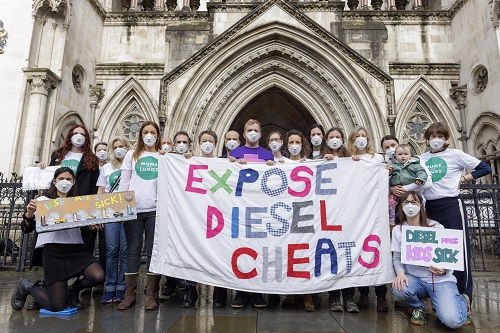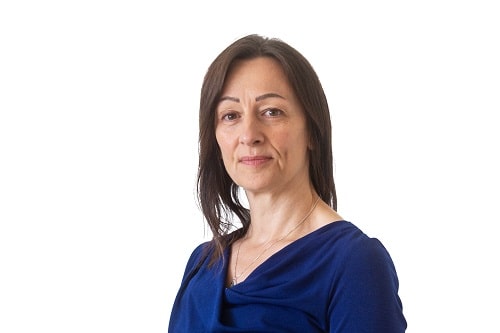Air pollution is often invisible; its impact is anything but. Whether you’re a parent worried about your child’s lungs, a construction worker breathing exhaust fumes, or a commuter passing through busy streets, polluted air is everyone’s problem.
Opinion
The air we share: why tackling pollution protects us all
Air pollution doesn’t stay in one place. If a street is polluted, everyone: workers, residents, school children and passers-by, is exposed. If your workplace is polluted, so is your community. And yet, despite knowing this, government action to tackle the problem remains painfully slow, leaving workers and the wider public at risk.
At the heart of this, we face a fundamental issue: we’re using the air, a shared resource essential for life, as a dumping ground for our waste. Our emissions don’t just vanish; they fill the space we all breathe, and that’s simply not acceptable.
 Photograph: Mums for Lungs
Photograph: Mums for Lungs
Air pollution: a hidden workplace risk
For too long, we’ve underestimated air pollution as a serious workplace hazard. Yet many workers, delivery drivers, construction teams, road maintenance crews and street cleaners, spend their days in the most polluted parts of our towns and cities. They’re exposed to harmful particulates from diesel vehicles, tyre wear, construction dust, and, increasingly, domestic wood burning.
Air pollution affects people from before they are born to the end of their lives, causing 29,000 – 43,000 premature deaths annually. The hidden cost of air pollution is the ill health that people can suffer for years. The impacts range from children growing up with stunted lungs – one in 11 children in the UK have asthma – to learning difficulties, clear links to cancer in non-smokers, fertility and cardiac issues, and diabetes and dementia in later life.
If we care about the health of outdoor workers, we need to care about the air they breathe. And government inaction is failing to protect them.
An everyday action making it worse
One of the most common and preventable contributors is vehicle idling. How often do we see contractor vans or delivery trucks parked with engines running?
With 420 litres of exhaust fumes released per minute of idling for a single small van or family size car, idling is a habit that wastes a significant amount of money on fuel and puts harmful toxins into the airspace where people, often workers, are spending hours.
Engine idling may seem harmless, but it has tremendous impacts that negatively affect everyone.
What we’re campaigning for
As a member of Mums for Lungs, I’ve seen first-hand how parents have been forced to lead the fight for cleaner air, because few others are stepping up fast enough. We campaign because we don’t think our children, or anyone else, should have to breathe dangerous air just to get through their day.

Our campaigns focuses on:
- Phasing out diesel vehicles
- Expanding car-free zones near schools ‘School Streets’ (which double as safer areas for all pedestrians)
- Highlighting the often-overlooked high levels of pollution from domestic wood burning
- Demanding stronger, legally binding air quality targets, at a minimum to be aligned with the European Union’s (EU’s) stricter targets.
- But much of this work is happening because parents, not politicians, are fighting for it. We at Mums for Lungs are filling the vacuum left by government inaction, raising awareness, pushing councils, and forcing these conversations into the public space.
When it hits home
This issue became heartbreakingly personal for me this week. My son was diagnosed with asthma on Monday. There’s no family history, so I can only conclude that environmental impacts have played a part. It’s devastating because, since his birth,
I’ve campaigned for clean air — for 15 years — and invested in expensive air filtration equipment for our home, doing everything I could to protect him. But it wasn’t enough.
Perhaps his condition would have been worse if we hadn’t done those things — but still,
I feel gutted. I feel like I’ve failed my son. And the advice I’ve been given? Move house. As if I can just uproot our lives, his school, his friends, because others have the right to drive, to idle, to light their fires. There’s something fundamentally wrong with that. We should not be forced to leave our community just so someone else can pollute the air my child breathes.
What needs to happen
The Government’s 25-year Environment Plan air pollution goal is “We will achieve clean air.” But cleaner air won’t happen by accident, it needs action at every level.
We are asking for the Government and local authorities to:
- Adopt legally binding World Health Organization (WHO) Air Quality Guidelines, via the Environmental Improvement Plan. The EU recently committed to align with WHO interim targets, now we need the UK Government to commit to the same
Improve public health communications on air pollution, so that the public can understand and support measures to clean up our air - Introduce stronger policies and incentives for boosting electric van uptake for businesses. The Climate Change Committee’s Seventh Carbon Budget recently highlighted the need for urgent action on this.
- Introduce policies to reduce traffic – action is required to have fewer vehicles on our roads, not just cleaner vehicles. Electric vehicles alone will not solve air pollution.
- Implement policies to phase out diesel vehicles.
 Photograph: Mums for Lungs
Photograph: Mums for Lungs
We want businesses and contractors to:
- Annually and publicly report on key air pollutants from their operations, and set out mitigation plans.
- Switch to active emission-free forms of transport in the first instance, switching to electric vehicles only if absolutely necessary.
- Use electric tools and battery power on sites where possible to reduce the use of polluting Non-Road Mobile Machinery
- Train staff on the risks of air pollution, including how they can reduce both their contribution and exposure.
We are asking for communities and individuals to:
- Walk or cycle instead of driving when you can
- Stop burning wood if you have an alternative source of heating
- Start conversations about air pollution at work, at home, with local representatives. Keep talking about it.
- Support campaigns that push for cleaner air.
- We would urge British Safety Council to ask for the same. We know air pollution knows no boundaries and has no ‘safe’ level.
The air we share
Ultimately, polluted air doesn’t respect job descriptions or property lines. Protecting workers means protecting the public, and vice versa.
Every policy change, every cleaner vehicle, every conversation, it all adds up.
Because if our streets are safe to breathe for the most vulnerable, our children, our outdoor workers, our elderly, they’re safe for everyone.
It shouldn’t be left to campaigners and communities alone. We need government leadership, now, before another generation suffers the consequences of inaction.
Find out more about Mums for Lungs at our website and social media: Bluesky, Instagram, Facebook and LinkedIn. Our Resources page includes flyers about air pollution, wood burning, idling and School Streets. You can also email us at:
[email protected]
Scott Paul is a volunteer with Mums for Lungs
OPINION

The air we share: why tackling pollution protects us all
By Scott Paul, Mums for Lungs on 04 April 2025
Air pollution is often invisible; its impact is anything but. Whether you’re a parent worried about your child’s lungs, a construction worker breathing exhaust fumes, or a commuter passing through busy streets, polluted air is everyone’s problem.

Why electric cooking is the future we need
By Tushar Nair, Global Cooksafe Coalition on 01 April 2025
The way we cook is more than just a matter of taste and convenience – it’s a critical climate, health, safety, and economic issue. Despite the growing momentum toward building electrification, cooking remains one of the last strongholds of fossil fuel reliance in our homes and commercial kitchens.

Beyond compliance: why noise control must evolve beyond PPE
By Gill Cussons, Noise & Vibration Solutions on 13 March 2025
Engineering solutions for noise control on plant, machinery and tools are often straightforward, low-cost and bring financial savings themselves, so it’s time employers moved away from the default position of purchasing and issuing personal hearing protection to workers.



